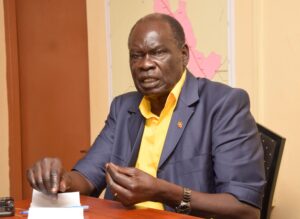
Hon. Eng. Hillary Onek
Minister for Relief, Disaster Preparedness and Refugees

Hon. Lillian Aber
Minister of State for Relief, Disaster Preparedness and Refugees

Mr. Patrick Okello
Commissioner/Refugee Management
The Department of Refugees was established by Section 7 & 8 of the Refugee Act, 2006.
Role of the Department of Refugees
- Receiving, documenting and settling refugees as well as coordinating stakeholders on refugee matters including MDAs, partners and NGOs.
- Being the Secretariat of the Refugee Eligibility Committee and the Refugee Appeals Board.
Refugee Statistics
Uganda currently is a host to 1,961,518 of 529,083 households of refugees and asylum seekers as of 31st October 2025 – comprising of 1,921,017 are refugees and 40,501 are asylum seekers.
Of these, 91% live in settlements, while 9% reside in urban areas mainly around Kampala, wakiso and Mukono Districts. Refugees in Uganda come from 34 countries, with 55.1% from South Sudan, 30.9% from the Democratic Republic of Congo and the remaining 14% from other 32 countries.
Women and children constitute 78% of the refugee population, older adults (60 years and over) make up 3%, youth (15-24 years) comprise 25%, those under 18 years’ account for 55%, and 51% of the population is female and the numbers continue to rise every day.
Kampala hosts 157,803 refugees and asylum seekers, many living in crowded conditions like other urban poor. Urban refugees face socioeconomic challenges including limited funding, insufficient livelihood opportunities, language barriers, lack of academic qualifications and accreditation, mental health issues and inadequate healthcare despite the Government’s expectation for self-reliance. There is a dedicated urban field unit run by UNHCR to assist refugees in addressing these issues that works together with Office of the Prime Minister, KCCA, the partners and other stakeholders to address these concerns.
Key outputs and Deliverables
- Refugees and asylum seekers issues with documents including:
- Refugee Identity Cards.
- Attestation forms for each household.
- Asylum seeker certificates for asylum seekers.
- Conventional Travel Documents for purposes of travel on medical, business, education grounds among others.
- Partners in the refugee response coordinated in accordance with Section 8(1) of the Refugees Act of 2006 and Regulation 63 of the 2010 Refugee Regulations
- The number of NGO partners in the refugee response fluctuates as some organizations exit while new ones join. To date, the Department of Refugees recorded 235 registered partners, comprising 84 international NGOs, 125 national NGOs, and 26 Community-Based Organizations (CBOs).
- Refugees voluntarily repatriated
- From the year 2020 to todate, a total of 3,598 households of 12,464 individuals registered have been repatriated from the settlements in the southwest back to Burundi.
- Social services provided to the Refugees
- Health:
- Supported facilities: 94 health facilities in 13 refugee-hosting districts.
- Core staffing: Approximately 1,918 health workers.
- Emergency response: Operating 65 ambulances across the districts.
- Accreditation: 80% of health facilities are accredited.
- Education:
- Schools: 662 in settlements and 475 in host communities.
- Learners: 626,804 in total (421,517 refugees, 205,287 nationals).
- Gross Enrolment Rates:
- Pre-primary: 36% for refugees, 14% for nationals.
- Primary: 91% for refugees, 28% for nationals.
- Secondary: 9% for refugees, 16% for nationals.
- Host community access: Approximately 100,863 children accessing education through UNHCR-supported settlement schools.
- Water and Sanitation:
- Infrastructure Development: Shift from emergency to long-term WASH infrastructure.
- Water Supply:
- 24.3 million litres supplied daily.
- 221 motorized water systems and 1,057 hand pumps.
- Average of 17 litres per person per day.
- 45% of water is pumped using renewable energy sources.
- Sanitation: Latrine coverage stands at 65%.
- Environmental Protection and Energy Access:
- Tree Planting:
- 8.4 million tree seedlings raised by June 2024.
- Over 4.2 million seedlings distributed.
- 737.1 new woodlots established.
- 1,563.6 hectares of woodlots maintained.
- Energy Access:
- 22,722 households supported with energy-efficient technologies and fuels.
- Solar systems were installed in 52 schools in Nakivale, Oruchinga, Rwamwanja, and Kyaka II settlements.
- Tree Planting:
- Health: